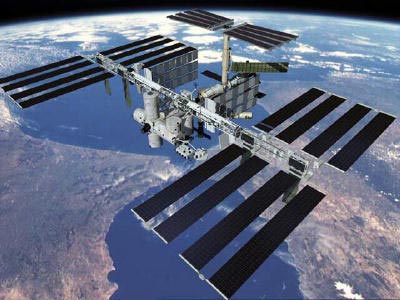Astronauts use recycled urine
Astronauts on the ISS international space station began to drink recycled water from urine and sweat from yesterday.

International space station.Photo: Reuters.
'It tastes great,' said astronaut Michael Barratt (USA), one of three people on the ISS station. The system to recycle urine into clean water is essential for the exploration of Mars and the moon. It also helps the US Space Agency (NASA) save a lot of money because they don't have to bring water to the international space station by spacecraft or missiles. It also allows 6 astronauts to join the ISS station (currently only 3).
Space shuttle Endeavor brought the above recycling system to the ISS station last November, but the astronauts could not use it right away because the device had a problem. In addition, the clean water samples that the system creates must be brought to earth for quality inspection. The problem was fixed on May 18, and the water test results were announced yesterday.
So when NASA announced that astronauts could drink recycled water, they were excited. Three people on the international space station raised glasses to congratulate NASA engineers. 'I used to think that this could only happen in science fiction , ' said astronaut Barratt. NASA scientists call the urine recycling system a 'big step in the history of conquering the universe'.
Marybeth Edeen, director of the recycling system project, revealed its working principle. From the toilet, the astronauts' urine was taken to a large container. Here 'ingredients' are boiled. Steam is collected and put into a separate container. The rest is removed. The rising steam is mixed with condensed steam in the air and then passed through the filtration device.
When 6 astronauts work on the ISS, the system can make about 22 liters of clean water within 6 hours. 'Many people believe that drinking recycled urine is a terrible thing, but in fact, such water is used on the earth. During the tsunami in Asia in 2006, disaster-prone areas lacked clean water. People have used our wastewater recycling technique to create clean water in a short time , 'Edeen said.
- Turn urine into drinking water for astronauts
- Removing billions of space tourism: Customers must also drink recycled urine
- See your urine to see if you are fine or weak
- Urine recycling machine irritates astronauts
- New discoveries about use
- 13 surprisingly interesting things about urine
- Using urine to create electricity, by the way, clean up all germs in the urine
- Diagnosis of the disease through urine
- Opaque urine: Causes, diagnosis and treatment
- What is saliva urine? How to treat?
- Yellow urine warns what you already know?
- Turn urine into drinking water in the universe
 Van Allen's belt and evidence that the Apollo 11 mission to the Moon was myth
Van Allen's belt and evidence that the Apollo 11 mission to the Moon was myth The levels of civilization in the universe (Kardashev scale)
The levels of civilization in the universe (Kardashev scale) Today Mars, the sun and the Earth are aligned
Today Mars, the sun and the Earth are aligned The Amazon owner announced a secret plan to build a space base for thousands of people
The Amazon owner announced a secret plan to build a space base for thousands of people